#rusalky
Text
rusalki are not mermaids. stop translating the word "rusalka" as "mermaid" and stop calling rusalki "slavic mermaids". it's confusing, it's misleading, and it's simply isn't true. the association of rusalka with a western mermaid and undine began in 19th century, when russian empire poets wanted to adapt a popular western motif of a sorrowful water maid that is unrequitedly in love with a mortal man. this literature character of rusalka has nothing to do with actual rusalki folklore and cult.
rusalki are natural undead spirits that are connected to slavic ancestral worship. they don't have tails. they are not in any way connected to the sea: only lakes, ponds, and rivers. often, they're not even connected to water at all: there are forest rusalki, field rusalki, meadow rusalki, etc. they are in close relationships with their human kin: during the spring and summer, they are used in agricultural rites and are believed to help with farming and raising crops. rusalki were sacred to slavic people. the "week of the rusalki" festival, when rusalki are believed to walk on earth and visit their relatives, is celebrated to this day. to call them "slavic mermaids" is very diminutive of their actual role in slavic cultures.
#slavic mythology#slavic paganism#slavic folklore#ancestral worship#ancestral veneration#ukrainian folklore#ukrainian culture#rusalky#rusalka
2K notes
·
View notes
Photo
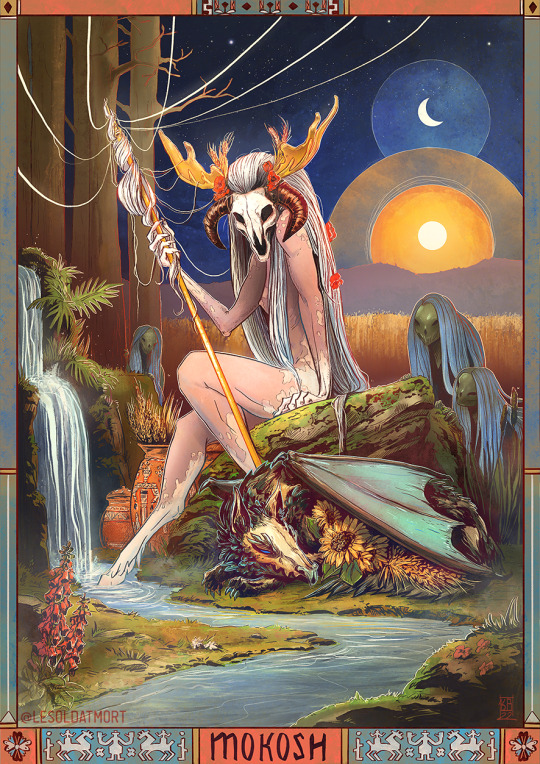
| MOKOSH |
The weaver of human's fate.
Mokoš (Mokosh, Mokuša) is another goddess connected to fertility but as a Mother figure - Goddess of earth and soil to which seeds are planted and from which they grow. Surrounded by rusalky and guardian of the seeds and harvest, Simargl, she is a powerful deity that watches over women and childbirth.
More (folk)lore, info and WIPs of this project on my P/treon.
#mokosh#folklore#slavic#skull#illustration#mythology#deities#slavic deities#dark art#fantasy#digital illustration#rusalky#simargl#creature#character design
639 notes
·
View notes
Text
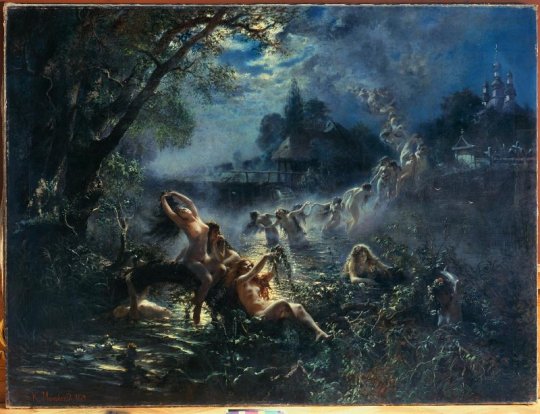
Konstantin Makovsky - Rusalky, 1879.
9 notes
·
View notes
Text





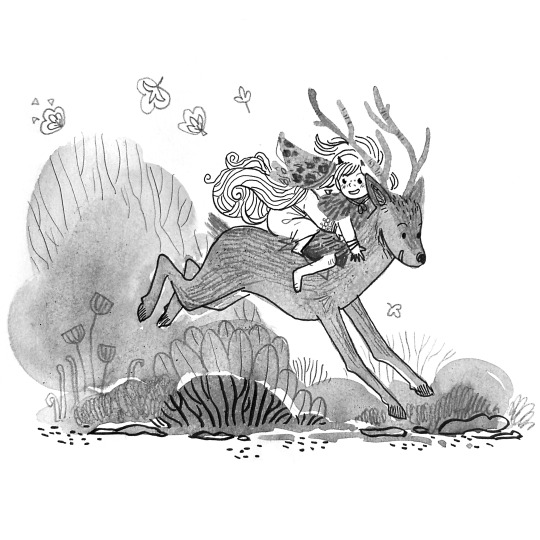





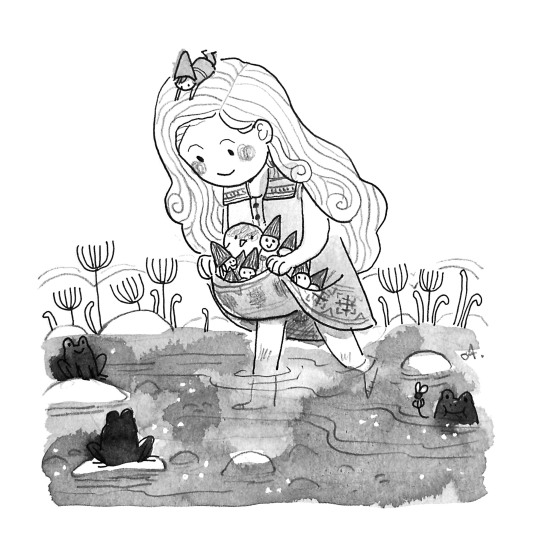
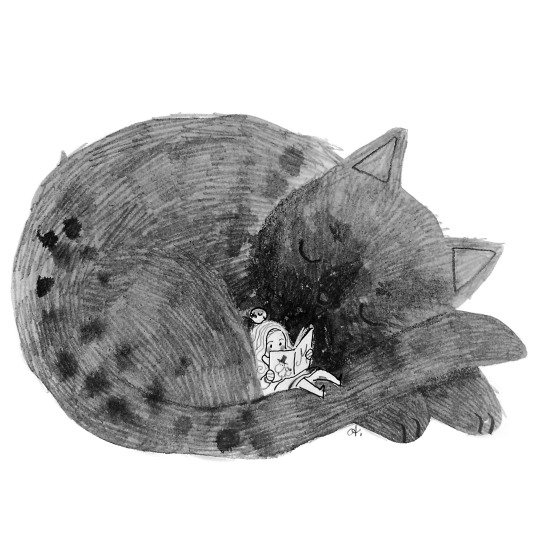
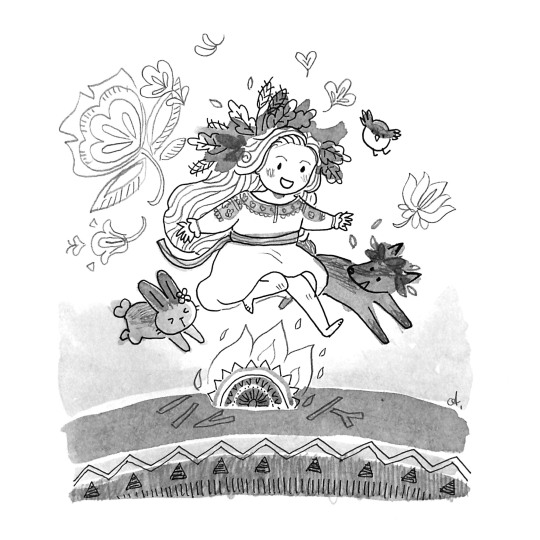
Some of my new Inktobers
#inktober#inktober 2023#adelaida art#adelaida draws rusalki#artists on tumblr#if only i remembered what tag I use here for my OCs#the girl's name is Elena and she's a young rusałka#thats a Slavic water demon
447 notes
·
View notes
Text

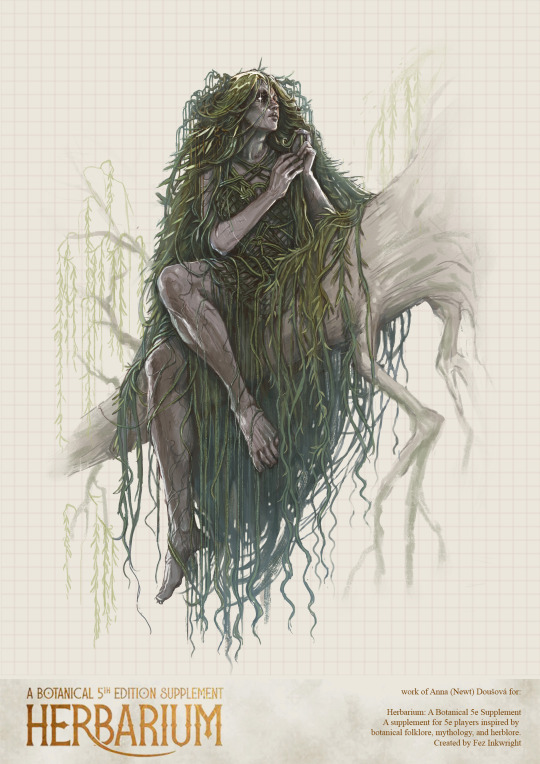
My depiction of Rusalka for the Herbarium 5e supplement by Fez Inkwright.
I was so happy when Fez asked if I wanted to illustrate her for the kicksarter art stretch-goals.
(preorders are still open: https://herbarium.backerkit.com/hosted_preorders )
#rusalka#slavic folklore#slavic mythology#rusalki#dnd 5e#dnd#5e#dnd monster#dnd creature#ttrpg art#fantasy art#character design#czech folklore#čumblr#moje žena <3#annathenewt art#my art
987 notes
·
View notes
Photo

What’s a funerary practice to the damned?
His flesh finally mine, though not in the way I wanted.
What’s a prayer through the lips of the cursed?
I moved in human ways once.
#rusalka#slavic mythology#mythologyart#folklore#nature#forest#art#arts#artist#artists on tumblr#painting#digital art#digital illustration#illustration#slavic folklore#rusalki#mermaid#mermaids#русалка#myart#siren#sirens#fantasy#fairy tales
425 notes
·
View notes
Text
A Deep Dive into the Horrifying Rusalki of Slavic Folklore
Would you like to be on the LGH tumblr tag list?
Welcome to Episode 173: A Deep Dive into the Horrifying Rusalki of Slavic Folklore! Today we will be diving headfirst into the algae-filled ponds and rushing green rivers of the Rusalki, learning about their wants, needs, desires, history, and even - about some modern day sightings of them. What’s a Rusalka, you ask? A Rusalka is the Slavic equivalent of a mermaid, but usually depicted without a tail. She is beautiful, alluring, and above all - dangerous. Join us as Aly walks Nat through the horrifying details that make this sea dwelling creature different from the Disney-fied sirens we’re used to.
THIS EPISODE IS SPONSORED!! Find out more about this week’s advertisers below!
This episode is sponsored by Füm. Start the year off right with The Good Habit by going to https://www.TryFum.com/HAUNTED and getting the Journey pack today. Füm is giving listeners of the show 10% off when they use our code “HAUNTED” to help make starting The Good Habit that much easier.
This episode is SPONSORED!!! For 24 meals for just $2.99 per meal, head to http://www.dinnerly.com/offer/haunted and use code “HAUNTED”!
Thanks for sponsoring this episode, Dinnerly!
#Let's Get Haunted#A Deep Dive into the Horrifying Rusalki of Slavic Folklore#Rusalki#Rusalka#Slavic Folklore#Spotify
7 notes
·
View notes
Note
Hi! I'm trying to research slavic mythology, especially the afterlife, and I've come across a place called Prav but i haven't found much information on it as a whole, i was wondering if you had any information on it
Hello!
To the best of my knowledge the idea that the cosmos separates into Prav, Yav and Nav comes from The Book of Veles, a famous forgery pretending to describe pre-Christian Slavic history and religious customs.
I don’t think I’ve ever seen Prav (or Yav) discussed more broadly outside of that context. However the word Nav/Navia does have real cultural background as a term used for to describe spirits of the dead.
Linguistic evidence implies that the early medieval Slavs may have shared a belief in some form of spirit or soul. In discussing these notions, various scholars point towards the word nav/nawie. This term is sometimes seen as being of pre-Slavic origin, and it is derived from Pre-Indo-European cultural heritage and refers to ‘death’ or ‘corpse’. It holds similar meaning in some of the contemporary Slavic languages, although in various (but not all) languages of the Slavs one may observe a shift in its meaning, whereby it refers to the sphere of demonology. For example, in eastern Polish dialects there are various names for rusałki, forest or water demons: mawki, mauki, nawki, miawki, mauki, mavky, niavky, majki. Another term for the spirits of the ancestors, which is also attributed an ancient origin, is lalka (lelka, łątka). It is noteworthy that after death the human soul went to the land of the dead, whose name is reconstructed as Nawia or Lala. (…)
We know very little about the Slavic land of the dead. I have already mentioned that the words nav/nawie, known from textual accounts, referred to dead people or their ghosts and occasionally (in later times) malevolent spirits. The late medieval textual accounts from the Czech area confirm that Navia was the name of the land of the dead among the Western Slavs. ‘To go to Navia’ meant to die and ‘to prepare someone for Nav’, meant to kill
- Slavic Journeys to the Otherworld. Remarks on the Eschatology of Early Medieval Pomeranians by Kamil Kajkowski
A mention of navias can even be found in the Tale of Bygone years, where they serve as a personification of the plague that fell on the town of Polotsk in 1092.
Something very strange occurred in Polotsk, a hallucination: there was a noise during the night: demons were running through the street like people. If anyone came out of their house to look, they were immediately and invisibly wounded by the demons, and died of it, and they did not dare leave their houses. Then they began to appear during the day on horseback, and they themselves could not be seen, but only their horses’ hooves were visible. And this is how they wounded the people of Polotsk and of the region. And this is why the people said: “Navias (навие) are slaying the people of Polotsk”.
- Tale of Bygone Years as found in Sources of Slavic Pre-Christian Religion, red. Juan Antonio Álvarez-Pedrosa
Andrzej Szyjewski in Religia Słowian explores some more cases of navias appearing as malevolent spirits in Slavic folklore, citing bulgarian „twelve nawi”, evil spirits that suck the blood of lying-in women and bring diseases as well as broader Southern Slavic belief in navije/navje, bird-shaped spirits harassing women during pregnancy and in childbirth.
Overall, as you probably can guess I highly recommend reading „Slavic Journeys to the Otherworld. Remarks on the Eschatology of Early Medieval Pomeranians” and then continuing your search from there.
70 notes
·
View notes
Photo

Rusalki by art-by-nemesis
55 notes
·
View notes
Text
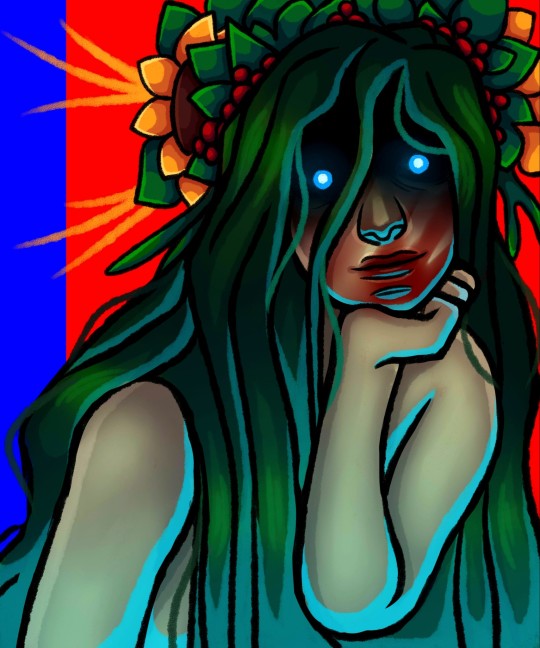
"rusalki are by definition no man’s women in this perspective, they are stuck between the maiden-phase and bride-phase forever [...] washing, moistening, and combing of their hair might thus be a symbolic representation of the endless wedding preparation that will never occur"
"a narrative representation of the desperate desire to fulfill the role that was denied to them in a real life."
From "Rusalki: Anthropology of time, death and sexuality in Slavic folklore" by Jiří Dynda
#my art#rusalka#slavic folklore#slavic mythology#ukrainian folklore#ukrainian culture#rusalki#rusalky#ancestral veneration#witch art#slavic paganism
188 notes
·
View notes
Photo
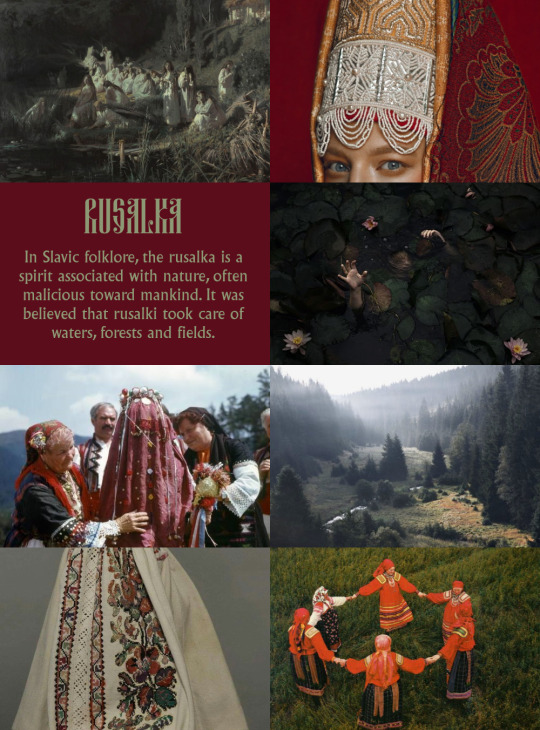
Mythology aesthetic: Rusałka
It was believed that girls who drown themselves because of unhappy love become rusalki. According to some beliefs, a man could also become a rusalka: for example, in the Sosnytsia Raion of the Chernihiv Oblast is believed that people of any sex can be converted into these spirits if they died on Trinity week. Apparently, they retain their gender and become rusalki.
#rusalka#rusalki#aesthetic#slavic#mythology#nature#summer solstice#kupala night#ivan kupala night#ivan kupala day#noc kupaly#waters#water#river#lake#forest#field#slavic folk#slavic folklore#slavic embroidery#mythology aesthetic#russia#ukraine#poland#belarus#slovakia#czech republic#bulgaria#slovenia#eastern european aesthetic
158 notes
·
View notes
Text
i keep going i Must draw a pony and then i forget
#remind me tomorrow to draw any of the mane 6 OR i could try my hand at av/stej ponies#spark is. either earth pony or pegasus#and fark could be (once she becomes his own person) a unicorn. in my mind#trace earth pony hammond and indra unicorns . all the rusalki are alicorns.#athetos is an alicorn but a very messed up one#magic horn made of bent and twisted thorns and biomechanic wings#ohhhh many thoughts.#rambles#ok gn
5 notes
·
View notes
Text
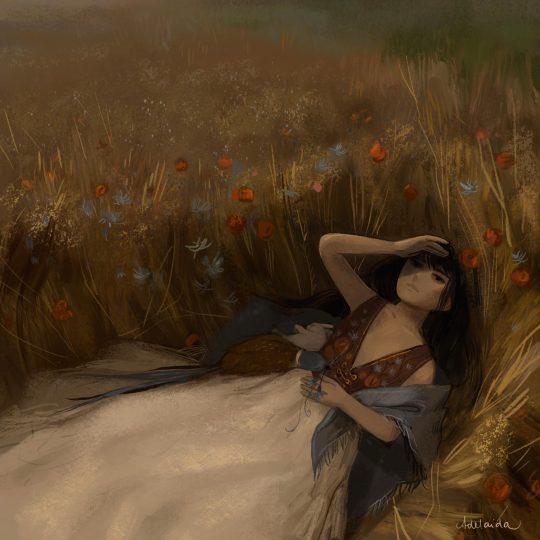
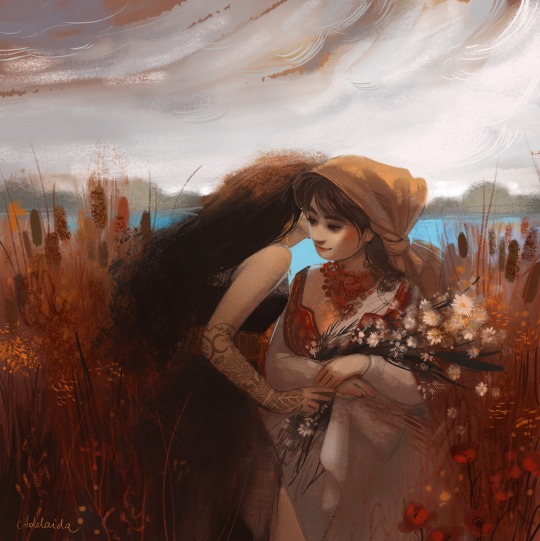
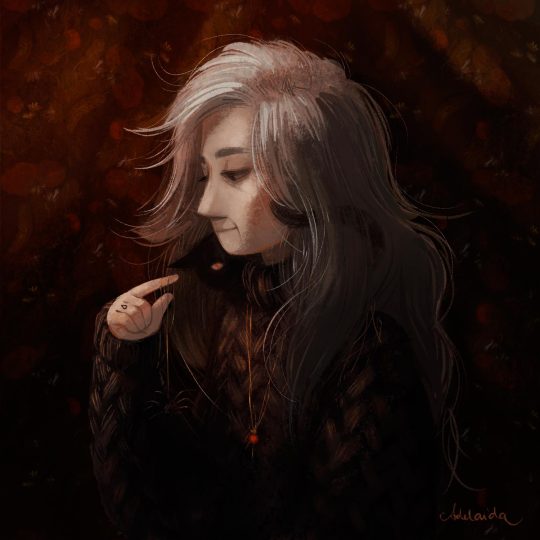

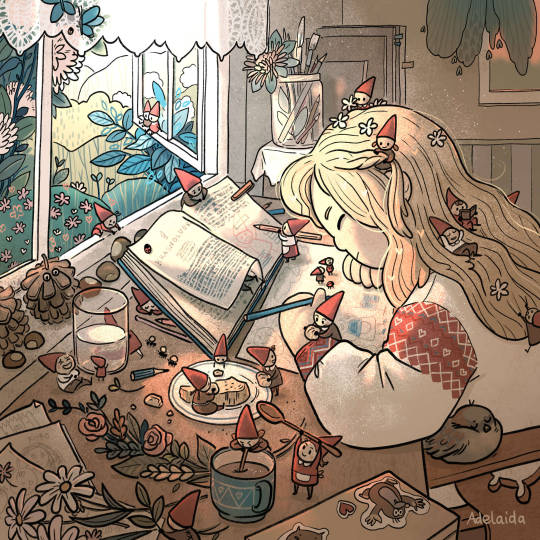
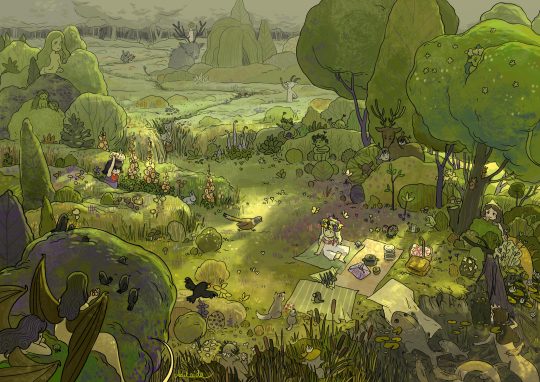
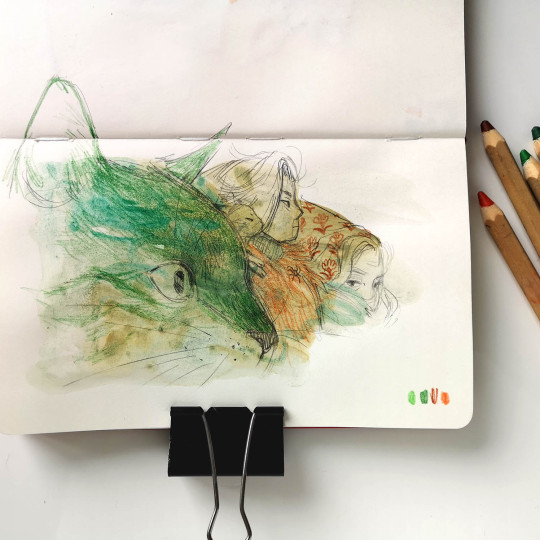
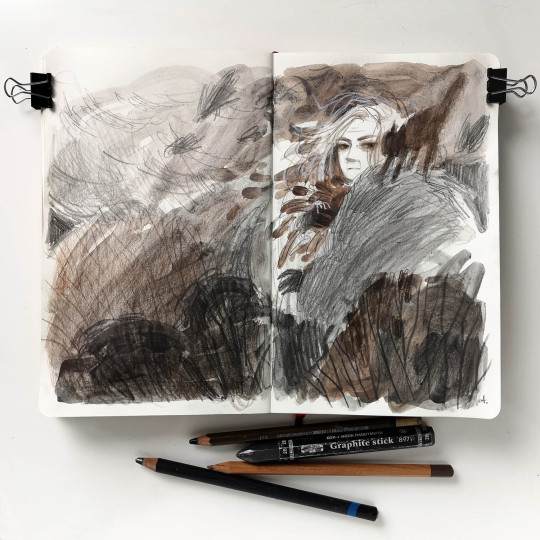
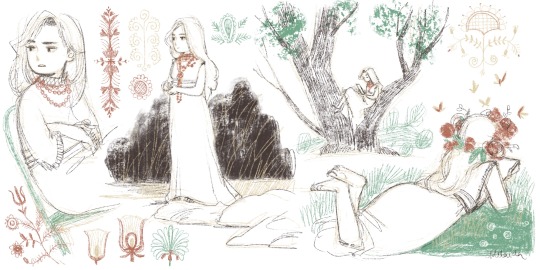
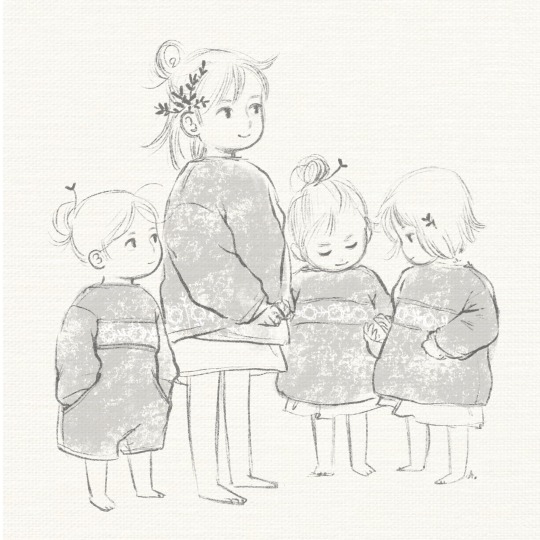
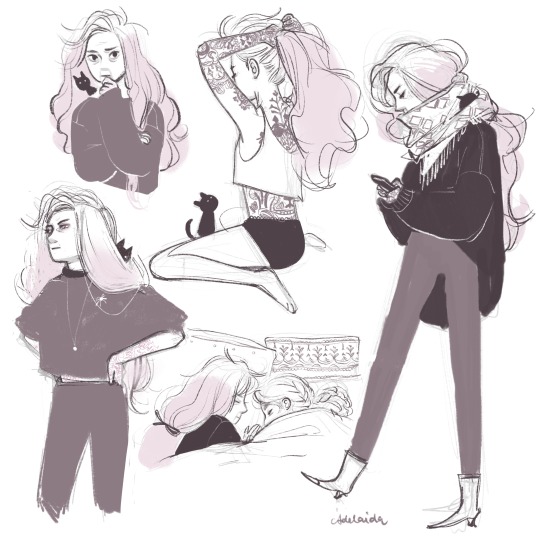
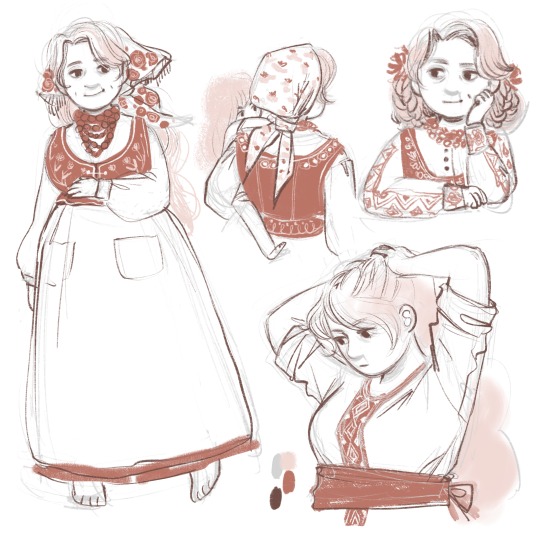
My OCs (♡-_-♡)
#rusalki#adelaida draws rusalki#adelaida art#i'm kinda shocked that i haven't shared them before here?#i probably assumed that people aren't really interested in OCs#more in fanarts#but! all the fanarts' characters were once silly little OCs too#so here we are!#i talk a bit about tem on my ko-fi and twitter#and have *plans* with them#as in comics#also thought about a childrens book bc the kids have a rather carefree life#if we forget about the fact that they are all dead :D
218 notes
·
View notes
Text
z rusały wymoczku będziesz tańczyć // a playlist for rusałki
zaczątek // volkman
rusalka, rusalka / wild rushes // the decemberists
dni błogie // dola
rusalki // lumin
lubelska kolęda // volkman
chodź // księżyc
wiszące skały // ifi ude, bart pałyga, marcin lamch
ballada o głupim wiesławie // żywiołak
kiedy deszcz zaczął padać na zawsze? // wędrowcy~tułacze~zbiegi
obrona włości biełgorajskiej przed janem zamoyskim // królówczana smuga
ile me lat? // księżyc
#some of my favourite music here...#also its the painting my pfp is from!! rusałki by witold pruszkowski!#everyone listen to ifi ude#my playlists#polish folklore#polska#poland#i hope the lyric in the title is right.. and my trascriptions#music#rusalki
8 notes
·
View notes
Text
FOLK MUSIC HELP
OK! My lovely folk music people! I am desperately trying to find folk songs about Rusalki, but the language barrier has left me blocked ToT
I've found an absolutely stellar album, from Kitka's The Rusalka Cycle - Songs Between the Worlds
youtube
I'm pretty darn close to just reaching out to them directly, but I'm wondering if any of y'all know of any folk songs about Rusalki????
It's really rare to get folk music about a monster like this and I am chomping at the bit to learn some and talk about them in my own folk music circles
Also if you know the english translations of the ones you know, I would thank you 1 million times to know what those songs are about 😭
#rusalki#rusalka#folk music#slavic folklore#ukrainian folk music#polish folk music#russian folk music#bulgarian folk music#belarusian folk music#czech folk music#I really am out here trying to tag all the places this folklore shows up#if i left any out let me know!#Youtube
5 notes
·
View notes
